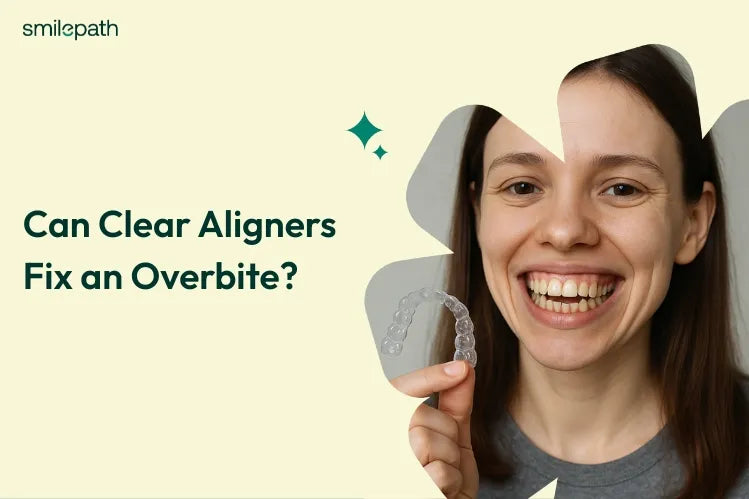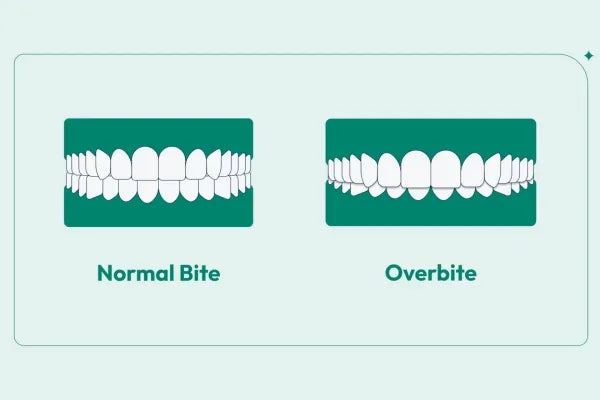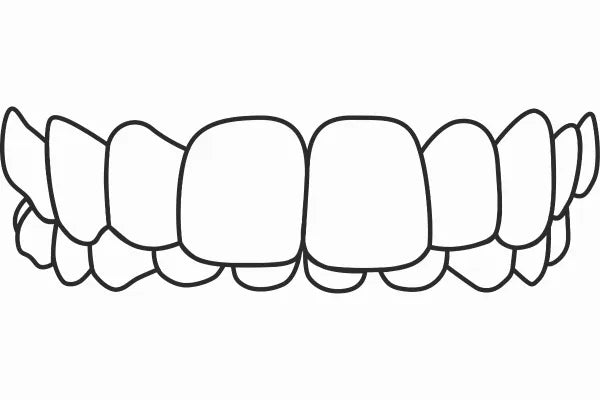
An overbite occurs when the upper front teeth protrude over the lower front teeth. It can be a cosmetic concern, but in more severe cases, it can cause issues with chewing and speaking. Fortunately, there are several options available to correct an overbite, including clear aligners. In this blog post, we'll explore whether clear aligners can fix an overbite, how they work, and their benefits and limitations.
What Causes an Overbite?
There are several factors that can contribute to the development of an overbite. Genetics is a common cause, as some people are born with a smaller lower jaw or a larger upper jaw, causing the teeth to overlap. Childhood habits such as thumb-sucking, using a pacifier, or prolonged bottle-feeding can also cause an overbite. Other factors that can contribute to an overbite include missing or impacted teeth, gum disease, and trauma to the mouth or jaw.

How Do Clear Aligners Work?
Clear aligners are a popular orthodontic treatment option that can be used to correct many dental issues, including overbites. They are custom-made trays that are worn over the teeth and apply a gentle, constant force to move the teeth into the desired position. Clear aligners are made from a BPA-free plastic that is nearly invisible when worn. Each set of aligners is designed to move the teeth gradually, with each set making small changes to the teeth's position.
The treatment plan is customized for each patient, and the number of aligners needed depends on the severity of the overbite. In general, most patients wear aligners for 20-22 hours per day and switch to a new set every 1-2 weeks. Over time, the teeth are shifted into the correct position, resulting in a better bite and a straighter smile.
Can Clear Aligners Fix an Overbite?
Clear aligners can be an effective solution for correcting mild to moderate overbites. They work by applying pressure to the teeth and gradually moving them into the desired position. While severe overbites may require more extensive treatment such as braces or surgery, many overbites can be corrected with clear aligners.

It's important to note that not all overbites are the same, and the cause of the overbite will determine whether clear aligners are a viable option. If the overbite is caused by dental misalignment rather than skeletal issues, clear aligners can be an effective treatment option.
Benefits of Clear Aligners for Overbites
There are several benefits to using clear aligners to correct an overbite. First and foremost, they are nearly invisible when worn, making them a popular choice for adults who want to straighten their teeth without drawing attention to their treatment. Additionally, clear aligners are removable, which means that patients can eat, brush, and floss as they normally would. This makes oral hygiene much easier than with traditional braces, which can be more challenging to clean around.
Another benefit of clear aligners is that they are typically more comfortable than traditional braces. There are no wires or brackets to irritate the inside of the mouth, and the aligners are custom-made to fit snugly over the teeth, making them more comfortable to wear.
Limitations of Clear Aligners for Overbites
While clear aligners can be effective for correcting an overbite, they may not be suitable for all cases. Severe overbites may require more extensive treatment, such as surgery. Additionally, clear aligners need to be worn consistently for best results, and it may be more challenging to correct a severe overbite with clear aligners than with traditional braces.
Alternatives to Clear Aligners
If clear aligners are not a good option for you, there are other treatments available to correct an overbite. Traditional metal braces are still a popular choice, especially for more severe cases. Another option is surgery, which can be used to reposition the jaw if the overbite is caused by skeletal issues.
Conclusion
Clear aligners are an excellent option for correcting mild to moderate overbites caused by dental misalignment. They are virtually invisible, easy to use, and effective at gradually shifting the teeth into the desired position. However, severe overbites may require more extensive treatment, such as surgery or traditional braces. If you're considering clear aligners to correct your overbite, talk to your orthodontist to see if they are a good fit for your needs.
FAQs
Mild to moderate overbites can be corrected without surgery through orthodontic treatment such as clear aligners or braces. Severe overbites may require surgery.
Clear aligners can cause discomfort or soreness in the first few days of wearing a new set of aligners. However, the discomfort typically goes away within a few days as the teeth adjust to the new aligners.
The length of treatment for an overbite with clear aligners depends on the severity of the overbite. Mild to moderate overbites can usually be corrected within 6-18 months.
While genetics plays a role in the development of an overbite, childhood habits such as thumb-sucking or prolonged bottle-feeding can contribute to the condition. It's important to discourage these habits early on to prevent an overbite from developing.


 Australia
Australia New Zealand
New Zealand Malaysia
Malaysia English
English Portuguese
Portuguese English
English English
English English
English English
English English
English Canada
Canada